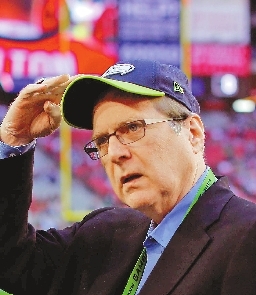
PAUL G. ALLEN, the co-founder of Microsoft who helped usher in the personal computing revolution and then channeled his enormous fortune toward transforming Seattle into a cultural destination, died Monday in Seattle. He was 65. The cause was complications of non-Hodgkin’s lymphoma, his family said in a statement. The disease recurred recently after having been in remission for years. He left Microsoft in the early 1980s, after the cancer first appeared, and, using his enormous wealth, went on to make a powerful impact on Seattle life through his philanthropy and his ownership of National Football League (NFL) and National Basketball Association (NBA) teams there, ensuring that they would remain in the city. Allen was a force at Microsoft during its first seven years, along with his co-founder, Bill Gates, as the personal computer was moving from a hobbyist curiosity to a mainstream technology, used by both businesses and consumers. When the company was founded in 1975, the machines were known as microcomputers, to distinguish the desktop computers with the hulking machines of the day. Allen came up with the name Micro-Soft, an apt one for a company that made software for small computers. The term personal computer would become commonplace later. The company’s first product was a much-compressed version of the Basic programming language, designed to suit those underpowered machines. Yet the company’s big move came when it promised the computer giant IBM that it would deliver the operating system software for IBM’s entry into the personal computer business. Gates and Allen committed to supplying that software in 1980. Allen was instrumental in putting together a deal to buy an early operating system from a programmer in Seattle. He and Gates tweaked and massaged the code, and it became the operating system that guided the IBM personal computer, introduced in 1981. That product, called Microsoft Disk Operating System, or MS-DOS, was a watershed for the company. Later would come Microsoft’s immensely popular Windows operating system. Allen stepped away from daily duties at Microsoft in the early 1980s, partly because of a deteriorating relationship with Gates, he remained on the Microsoft board until 2000. Gates said in a statement Monday: “From our early days together at Lakeside School, through our partnership in the creation of Microsoft, to some of our joint philanthropic projects over the years, Paul was a true partner and dear friend. Personal computing would not have existed without him.” Allen donated more than US$2 billion toward nonprofit groups dedicated to the advancement of science, technology, education, the environment and the arts. (SD-Agencies) | 
